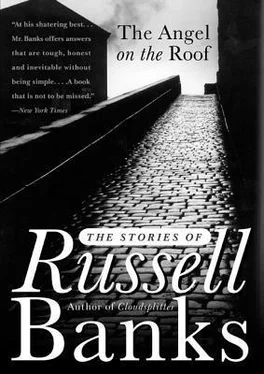Katongans generally, and Gbandehans especially, socialized outdoors and at night, when it was finally cool enough to eat a large, lingering meal of rice and beans, hot peppers, and bits of what they called bush meat, and drink cheap liquor distilled from palm wine, talk politics and religion, and later dance and make love. Every evening, the Gbandehans, rich and poor and young and old alike, shed their work clothes, washed their red-ocher skins, and dressed up — the men, sockless in American running shoes, wearing dark, sharply creased slacks and starched, white guayabera shirts; the women in high heels and provocative, colorful rayon dresses, their oiled black hair elaborately plaited and pinned into thick, uplifted wings and blades — and headed for the cafés, bars, and restaurants that crowded the alleys and side streets off Binga Park.
I was halfway through my first Rhino, waiting for the local people to start appearing, when I glanced up and noticed in the distance a strangely contorted figure pass along the square, his shape silhouetted sharply against the yellow glare of fading sunlight off the park. Dressed in a few scraps of dark cloth, barefoot, filthy, and hunched over like an ape, he lurched more than walked, and then suddenly he glanced in my direction, straightened, and, stiff-legged, lumbering like Dr. Frankenstein’s monster, turned off the square and entered the cul-de-sac, where, at the far end, at what had become my usual table, I sat staring.
The street was narrow, a cobbled walkway barely wide enough for a single car to enter. The attached, three- and four-story, unpainted, wood-frame buildings that lined the street dated from early in the colonial era. On opposite sides of the street, tilted balustrades and balconies loosely attached to shuttered French windows nearly met each other overhead. The buildings once housed the waiting rooms and offices of the home country’s clerks and administrators. Now these dusty, unlit, high-ceilinged rooms were used mainly for the permanent storage of empty file cabinets, rotting rolltop desks, glass-fronted bookcases, and countless cartons of moldering, mouse-eaten colonial records. The only commercial action on the street nowadays took place at ground level, where the numerous small repair shops, grocers, barbers, and other native businesses had drawn down their slatted metal shutters for the day. My café was the only business open for business, and at the moment I was its sole customer. The barman and a waitress were lounging inside, flirting with each other and smoking American cigarettes in the shadows.
When I first sat down, I had felt sociable, a citizen of the town, practically. But now, with this strange creature bearing down on me, I suddenly felt alone and cut off and, for the first time since entering the country, vulnerable. Even at a distance, I could see that he was just another madman, a dust-covered, ill-coordinated, mumbling man of indeterminate age. Such a figure was not an unusual sight in the cities and towns of Katonga, where there were no insane asylums, no mental health services of any kind, for that matter, and where a large segment of the adult population still suffered from the horrors of the 1960s revolution and the civil war a decade later. The thousands of young men and women who had been maddened by the savagery of the wars and had survived into middle and old age were generally homeless and either alcoholic or drug-addicted. But nonviolent. One did not have to fear them. They seemed to have a place, a niche, in the community, as in a family, and were gently tolerated and even cared for by the people.
This madman, although much taller and more muscular than others I had seen, was typical. His hair and beard were matted into thick, unkempt locks, and, except for a torn undershirt and a single filthy rag that partially covered his private parts, he was naked. What was unusual was the light that appeared in his face when he first saw me and that increased steadily in brightness as he neared my table. His heavy brow was lifted, and his large eyes glowed like coals. His nostrils flared with expectation, and his lips were drawn back from his teeth in a happy grimace. I had never anywhere encountered a look like that before. His expression was that of a man who, after years of seeking wisdom, had been surprised by it mere seconds ago; and the simple, overwhelming pleasure of at last having obtained wisdom was temporarily keeping him from applying it.
He seemed to be looking straight at me — understandably, I suppose, since I was the only person in his line of sight — but his gaze made me uncomfortable in the extreme, as if he thought somehow that I had made him mad and not the wars. As he neared my table and locked, not just his face on to mine, but his eyes on to my eyes as well, my discomfort grew worse. I tried to look away, but could not. I reached into my pocket for coins — an old reflex when approached by mad people and beggars, whether I mean to give money or not — but he shook his massive head, swirling his heavy locks like boas, and indicated with a scolding forefinger that he did not want money. Strangely familiar was his face and expression, as if we were old friends much altered, meeting unexpectedly after many years, or lost childhood cousins suddenly reunited as adults — yet he was, of course, an utter stranger to me. He couldn’t have been more a stranger to me, this African man who had endured what I could not even begin to imagine: years of hallucinatory butchery, immeasurable loss, grief, and pain, and, for the rest of his life, poverty and woe, helplessness and ridicule, charity and invisibility. Yet I knew him somehow. And he knew me.
He finally lurched to a stop before my table and stood there, his ecstatic expression unchanged. He towered over me unsteadily, as if he were about to fall upon my neck and embrace me or else give me a terrible beating. And still I couldn’t break his gaze. I was afraid to look away, to seek out the barman, for instance, and signal him somehow to come and help me, free me from this man’s rapt attention, distract him, scold him, send him on his way. It was as if the madman had cast a spell upon me, or as if I were dreaming and struggling vainly to wake myself.
Finally, I managed to address him, my voice quavery and fearful. “What do you want?” I asked. “What do you want from me?”
At that, the man’s face seemed to break its hold on mine, or my face broke its hold on his. His brow slipped lower, and the light behind his eyes slowly dimmed and went out. His mouth loosened. He licked his cracked lips with a large, pink tongue, and he put his fists to his ears like a baby about to cry. In a high, thin voice, an embarrassed tenor’s voice, he said, “I know you, mistah! I know you longtime. You back this time to stay wit’ us, mistah?” he asked, and cackled derisively.
Suddenly, he reverted to his earlier ape-walk and bolted away from my table. He grabbed a ceramic Cinzano ashtray from the adjacent table and placed it on his head like a sailor’s cap, until, finally, the barman, whose name was Andrew, noticed his presence and came running from inside the café. Andrew was a slender, fawn-colored young man with a pencil mustache and gold-rimmed spectacles, and he managed the café as well as ran the bar. “Hey, Djinn!” he said, laughing. “Gimme that!” He held out his hand for the ashtray.
The madman removed the ashtray from his head and slowly passed it over to Andrew, who gave him a twenty-pence coin, as if in payment.
“G’wan, now,” Andrew said. “Don’t bother the gentleman.” He placed a hand on Djinn’s shoulder and turned him back the way he had come. Slowly, with unaccountable sadness, the madman, still hunched over and lurching side to side, walked away. I watched him, as unable to remove my gaze from his bent form as when earlier he had captured me with his enraptured face. Who was he, really? And how had he gained such power over me, even if only for those few seconds?
Читать дальше












